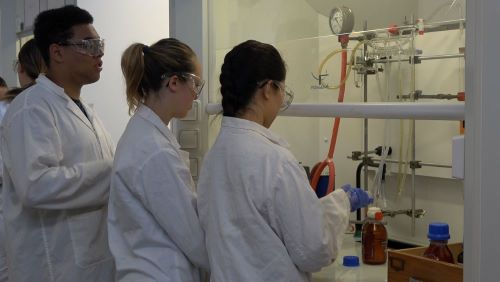The 2030 French Chemistry laureate given in response to the change in skills required to reach lower carbon levels

The consortium consisting of France Chimie, the Federation Gay-Lussac (FGL) and the l’ADIUT (Board of Directors of the University Institutes of Technology (IUT)) are delighted to have been selected in the call to express interest in Skills and Future Professions (Compétences et Métiers d’Avenir) in its project prioritizing « Lower carbon levels in industry » in the “France 2030” plan.
Chemistry in France is the industrial sector that has reduced its CO2 emissions the most, with a decrease of 65% since 1990. At the end of 2022, in the final stage of lowering carbon levels, it published an ambitious objective of a supplementary reduction in CO2 emissions of 36% in 2030 compared to 2015.
One of the conditions to reach this objective is the availability of a skilled workforce. As a result, the chemistry industry, an already innovative sector, anticipates recruiting 120 000 employees within 5 years. It is therefore essential that not only is education and continued training provided but that these integrate the skills required for decreasing carbon levels in all aspects of the chemical industry. In addition, new solutions should be developed with the view to the ecological transition of other sectors of the economy.
The « Decarbochim » project objective therefore responds specifically to this challenge by:
- Making available, over the whole of France, high quality education courses and training based on the same skill framework with the aim of lowering carbon levels in the chemical industry;
- Not only spreading the « lower carbon » culture to chemistry students but also more widely to all employees.
This project is unique due to the size of the consortium involved. In fact, it consists of all the chemistry and process engineering graduate schools of the Federation Gay-Lussac (FGL) together with the 22 chemistry and process engineering departments in the IUTs (University Institutes of Technology).
There are three parts to the project. First, the development of the educational content for lowering carbon levels (redefining the course modules, new content, etc.). Second, providing the infrastructure and equipment for the distribution of teaching tools such as the installation of 30 pilot reactors over the whole of France, as well as learning management systems (LMSs). Finally, the transmission of this “lower carbon culture” as well as promoting different professions.
